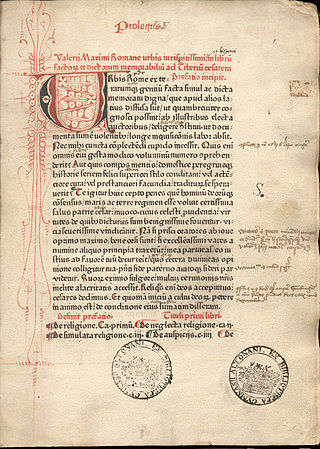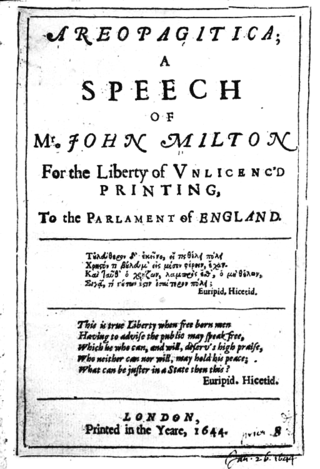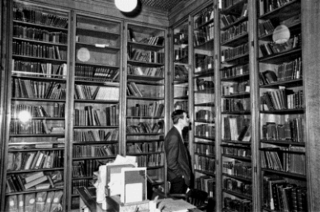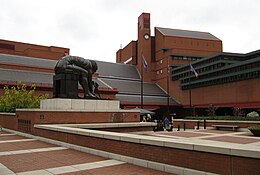
In the history of printing, an incunable or incunabulum is a book, pamphlet, or broadside that was printed in the earliest stages of printing in Europe, up to the year 1500. Incunabula were produced before the printing press became widespread on the continent and are distinct from manuscripts, which are documents written by hand. Some authorities include block books from the same time period as incunabula, whereas others limit the term to works printed using movable type.

A manuscript was, traditionally, any document written by hand or typewritten, as opposed to mechanically printed or reproduced in some indirect or automated way. More recently, the term has come to be understood to further include any written, typed, or word-processed copy of an author's work, as distinguished from the rendition as a printed version of the same.

Cambridge University Library is the main research library of the University of Cambridge. It is the largest of over 100 libraries within the university. The library is a major scholarly resource for members of the University of Cambridge and external researchers. It is often referred to within the university as the UL. Thirty-three faculty and departmental libraries are associated with the University Library for the purpose of central governance and administration, forming "Cambridge University Libraries".

Areopagitica; A speech of Mr. John Milton for the Liberty of Unlicenc'd Printing, to the Parlament of England is a 1644 prose polemic by the English poet, scholar, and polemical author John Milton opposing licensing and censorship. Areopagitica is among history's most influential and impassioned philosophical defences of the principle of a right to freedom of speech and expression. Many of its expressed principles have formed the basis for modern justifications.

Joseph Ames was an English bibliographer and antiquary. He purportedly wrote an account of printing in England from 1471 to 1600 entitled Typographical Antiquities (1749). It is uncertain whether he was by occupation a ship's chandler, a pattern-maker, a plane iron maker or an ironmonger. Though never educated beyond grammar school, he prospered in trade and amassed valuable collections of rare books and antiquities.

Erotic literature comprises fictional and factual stories and accounts of eros intended to arouse similar feelings in readers. This contrasts erotica, which focuses more specifically on sexual feelings. Other common elements are satire and social criticism. Much erotic literature features erotic art, illustrating the text.

The Royal Library in Copenhagen is the national library of Denmark and the university library of the University of Copenhagen. It is among the largest libraries in the world and the largest in the Nordic countries. In 2017, it merged with the State and University Library in Aarhus to form a combined national library. The combined library organisation is known as the Royal Danish Library.
Legal deposit is a legal requirement that a person or group submit copies of their publications to a repository, usually a library. The number of copies required varies from country to country. Typically, the national library is the primary repository of these copies. In some countries there is also a legal deposit requirement placed on the government, and it is required to send copies of documents to publicly accessible libraries.

The National Library of Wales, Aberystwyth, is the national legal deposit library of Wales and is one of the Welsh Government sponsored bodies. It is the biggest library in Wales, holding over 6.5 million books and periodicals, and the largest collections of archives, portraits, maps and photographic images in Wales. The Library is also home to the national collection of Welsh manuscripts, the National Screen and Sound Archive of Wales, and the most comprehensive collection of paintings and topographical prints in Wales. As the primary research library and archive in Wales and one of the largest research libraries in the United Kingdom, the National Library is a member of Research Libraries UK (RLUK) and the Consortium of European Research Libraries (CERL).

A national library is a library established by a government as a country's preeminent repository of information. Unlike public libraries, these rarely allow citizens to borrow books. Often, they include numerous rare, valuable, or significant works. A national library is that library which has the duty of collecting and preserving the literature of the nation within and outside the country. Thus, national libraries are those libraries whose community is the nation at large. Examples include the British Library in London, and the Bibliothèque nationale de France in Paris.

The Cotton or Cottonian library is a collection of manuscripts once owned by Sir Robert Bruce Cotton MP (1571–1631), an antiquarian and bibliophile. It was one of the three "foundation collections" of the British Museum in 1753, and is now one of the major collections of the Department of Manuscripts of the British Library. After the Dissolution of the Monasteries, many priceless and ancient manuscripts that had belonged to the monastic libraries began to be disseminated among various owners, many of whom were unaware of the cultural value of the manuscripts. Cotton's skill lay in finding, purchasing and preserving these ancient documents. The leading scholars of the era, including Francis Bacon, Walter Raleigh, and James Ussher, came to use Sir Robert's library. Richard James acted as his librarian. The library is of special importance for having preserved the only copy of several works, including Beowulf, The Battle of Maldon and Sir Gawain and the Green Knight.

The Legal Deposit Libraries Act 2003 is an Act of the Parliament of the United Kingdom which regulates the legal deposit of publications in the United Kingdom. The bill for this Act was a private member's bill. This Act was passed to update the legislation on legal deposit to reflect the digital age.

The Biblioteca Nacional de España is a major public library, the largest in Spain, and one of the largest in the world. It is located in Madrid, on the Paseo de Recoletos.

An Ex Libris from ex-librīs, also known as a bookplate, is a printed or decorative label pasted into a book, often on the front endpaper, to indicate ownership. Simple typographical bookplates are termed "book labels".

The National Library of Bhutan, located in Thimphu, Bhutan, was established in 1967 for the purpose of "preservation and promotion of the rich cultural and religious heritage" of Bhutan. It is located in the Kawajangtsa area of Thimphu, above the Royal Thimphu Golf Course, near the Folk Heritage Museum and the National Institute for Zorig Chusum.

The Private Case is a collection of erotica and pornography held initially by the British Museum and then, from 1973, by the British Library. The collection began between 1836 and 1870 and grew from the receipt of books from legal deposit, from the acquisition of bequests and, in some cases, from requests made to the police following their seizures of obscene material.

The British Library Philatelic Collections is the national philatelic collection of the United Kingdom with over 8 million items from around the world. It was established in 1891 as part of the British Museum Library, later to become the British Library, with the collection of Thomas Tapling. In addition to bequests and continuing donations, the library received consistent deposits by the Crown Agency and has become a primary research collection for British Empire and international history. The collections contain a wide range of artefacts in addition to postage stamps, from newspaper stamps to a press used to print the first British postage stamps.

The Crown Agents Philatelic and Security Printing Archive was deposited with the British Museum from the 1960s, though the first recorded deposit from the Crown Agents was in 1900. The archive consists of a range of philatelic and written material which were the Crown Agents' working records. It is the most comprehensive record of British Colonial and Commonwealth stamp issues of the last 100 years.

The Baden State Library is a large universal library in Karlsruhe. Together with the Württembergische Landesbibliothek, the BLB is the legal deposit and regional library for Baden-Württemberg.

Books in the United Kingdom refers to books in the United Kingdom. In other words, "written or printed work consisting of pages glued or sewn together along one side and bound in covers", in the United Kingdom.




















